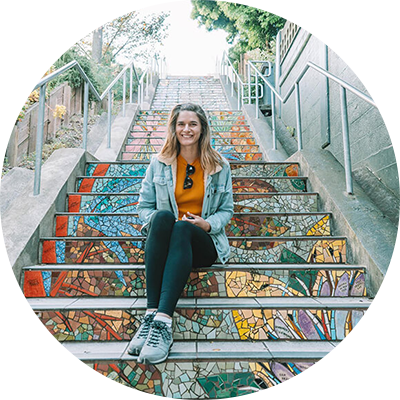Short on time? Our picks for the best baby carriers & toddler carriers for hiking are the Osprey Poco LT Child Carrier and Kelty Journey PerfectFIT Elite Child Carrier.
This year, find the best baby carriers for hiking comfortably with kids.
Listen, ya’ll. I don’t have a kid, but I have a cat that I wrap in a baby carrier and cart around the house *like a baby.*
Ok, more seriously– while I don’t have a child, I have a lot of experience backpacking over long distances with a heavy backpack. There’s no better preparation than that for lugging a child into the wilderness.
If you’ve got a human baby that *you* want to lug into the wilderness, check out my list of the best baby carriers in 2024. I’ve found a child carrier for every situation and every age range.
So whether you have a newborn and need to kick the postpartum with some good ol’ vitamin D, or you’re a seasoned pro looking to upgrade your current hiking baby carrier, I’m positive you’ll find what you’re looking for here.
Is your baby covered in fur? Check out our article on the best dog backpack carriers for hiking!
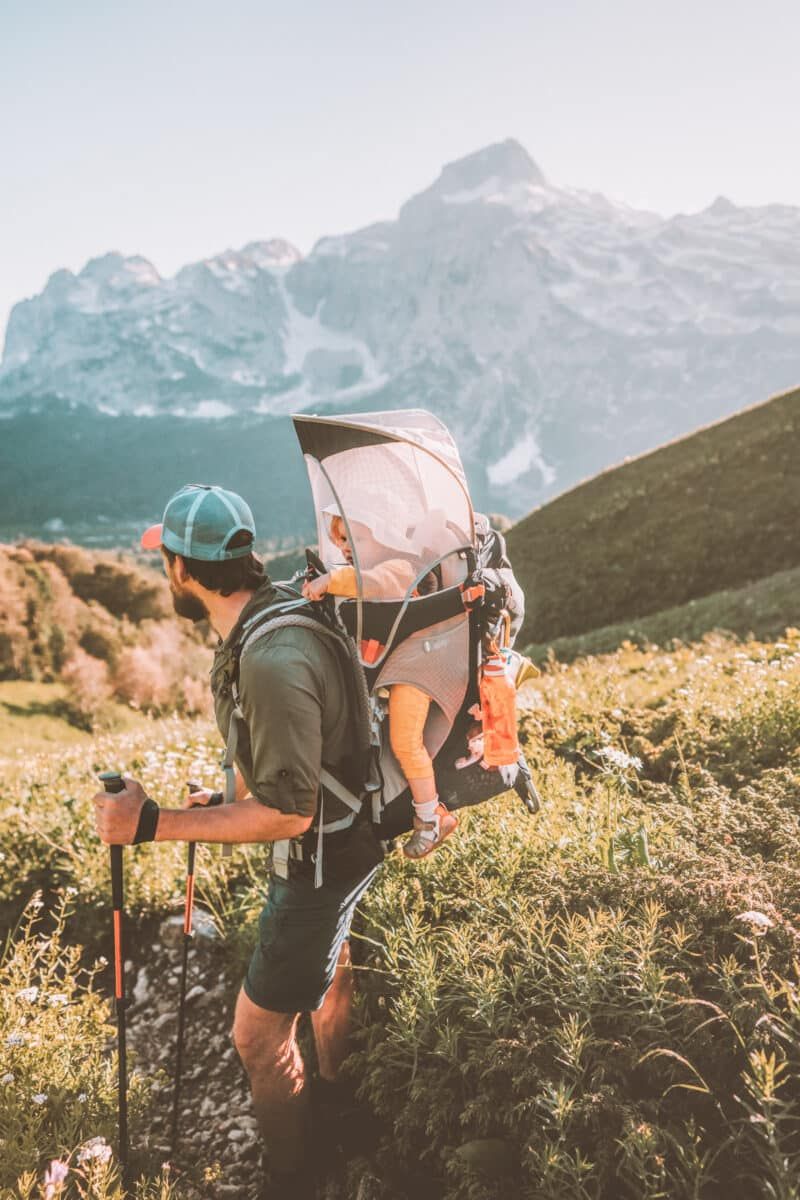
Here’s a quick look at our recommendations
- Best Budget Baby Hiking Carrier – ClevrPlus Cross Country Baby Backpack
- Best Luxury Baby Hiking Carrier – Kelty Journey PerfectFIT Elite Child Carrier
- Best Carrier for a Newborn – Lillebaby Complete All Seasons Ergonomic 6-in-1 Baby Carrier
- Best Lightweight Baby Hiking Carrier – Boba Baby Wrap Carrier
- Best Baby Carrier for Hiking in Hot Weather – Luvdbaby Premium Baby Backpack Carrier
- Most Comfortable Baby Hiking Carrier – Deuter Kid Comfort Pro Child Carrier
- Most Versatile Child Hiking Carrier – Thule Sapling Child Carrier
- Best Compact Baby Carrier for Hiking – phil&teds Escape Child Carrier Frame Backpack
- Best Hiking Carrier for a 1-Year-Old – Minimeis G4 Shoulder Carrier
- Best Carrier for a 2-Year-Old and 3-Year-Old – Colugo The Baby Carrier
- Best Carrier for a 4-Year-Old or 5-Year-Old – Chicco SmartSupport Aluminum Frame Backpack Carrier
- Best Carrier for Ergonomic Baby Position – BabyBjörn New Baby Carrier One Air
- Best Carrier Specifically for Women – Deuter Kid Comfort Active SL Child Carrier–Women’s
- Best Carrier for Traveling – Osprey Poco LT Child Carrier
- Best Carrier for Overnight Travel – Osprey Poco Plus
#1 ClevrPlus Cross Country Baby Backpack
Best Budget Baby Hiking Carrier
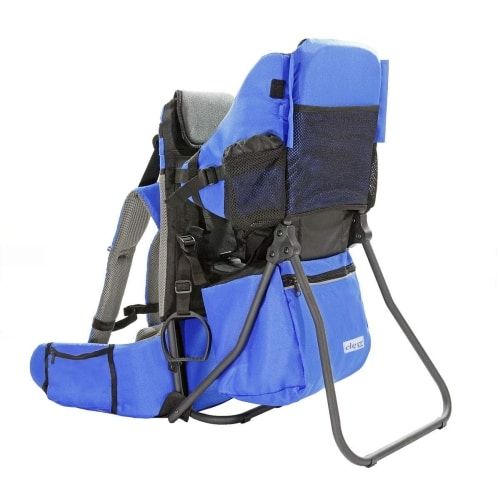
Our Rating: 4.9/5
Weight: 5.5 lbs
Weight Capacity: 33 lbs
Storage Capacity: Unknown
Sunshade: Yes
Freestanding: Yes
No one needs *more* expenses as a new parent. If you want to get hiking and need a reasonably priced child carrier, check out the ClevrPlus Cross Country Baby Backpack.
This well-loved entry-level pack has a 33-pound weight limit and itself weighs just 5.5 pounds, making it ideal for smaller kids. The suspension system is adjustable and rated for kids from 9-48 months.
The ClevrPlus Cross Country is freestanding and comes with a zippered storage compartment beneath the child’s saddle and a zippered pocket on each hip belt.
Importantly, kid comfort is not a problem with this pack. Most kiddos love this thing. While many parents also love this pack, some have problems with the weight distribution between the shoulder straps and the waist belt.
ClevrPlus website offers 5% off to readers who use our coupon code: XT26HCB3QJ.
PROS
- Affordable price
- Padded lumbar support
- Washable drool rag
- Lightweight
- Comfortable for babies
CONS
- Low max weight
- Waist belts may not fit petite women
- Weight distribution could be better
CHECK PRICE ON:
#2 Kelty Journey PerfectFIT Elite Child Carrier
Best Luxury Baby Hiking Carrier
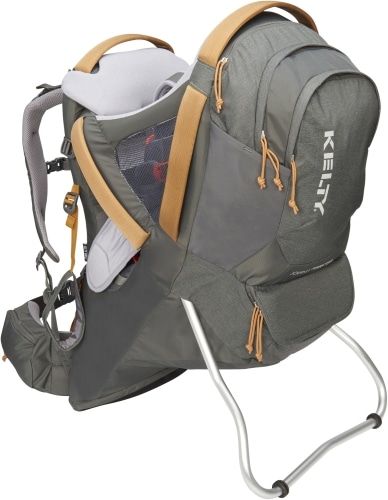
Our Rating: 5/5
Weight: 7 lbs 4 oz
Weight Capacity: 50 lbs
Storage Capacity: 26 L
Sunshade: Yes
Freestanding: Yes
Got an REI gift card to burn? The Kelty Journey PerfectFIT Elite Child Carrier is the best luxury baby hiking carrier. In addition to the five-point harness, this luxe hiking pack has an aluminum roll cage to protect the babe if you fall.
The child seat is wide, and the foot loops are adjustable to accommodate kid comfort.
This hiking carrier for toddlers fits waists from 33 to 51.5 inches and torso lengths of 15.5-21 inches.
The standout feature is all the extra storage space. The Kelty Journey has 26 liters of storage space, including water bottle holders and a hydration sleeve for a water bladder.
There’s even a dedicated “dirty” compartment for gross things you can’t, in good conscience, leave on the ground.
PROS
- Includes water bottle holders
- Nine exterior pockets plus the main compartment
- Safety harness and roll cage
- Multiple grab handles for easy loading
- Compatible with a water bladder
CONS
- Shoulder straps may be narrow for some men
CHECK PRICE ON:
#3 Lillebaby Complete All Seasons Ergonomic 6-in-1 Baby Carrier
Best Carrier for a Newborn
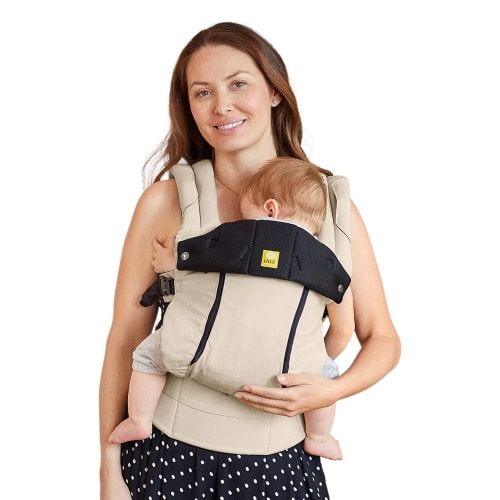
Our Rating: 4.8/5
Weight: 2.53 lbs
Weight Capacity: 7-45 lbs
Storage Capacity: Not listed
Sunshade: Yes
Freestanding: No
The best baby hiking carriers for hiking with newborns are frameless or soft-structured carriers. I like the Lillebaby Complete All Seasons Ergonomic 6-in-1 Baby Carrier because of its reasonable price and the fact that you can wear it in multiple configurations.
Soft-structured carriers like the Lillebaby lack extra storage space and all the features of a hiking backpack, but honestly, it is what it is because you can’t safely put a small baby in backpack-style carriers.
This soft structured carrier is suitable for babies 7-45 pounds, and you can wear it on your front or back and with the baby facing you or away from you.
This frameless baby carrier for hiking has a storage pocket on the front; it’s machine washable, has a removable sleeping hood, and uses breathable mesh with a zipper on the front so you can control the ventilation.
PROS
- Perfect for children under six months
- Reasonably priced
- Removable sleeping hood
- Breathable mesh to control body temperature
CONS
- Limited storage space
- Uncomfortable with bigger kids
#4 Boba Baby Wrap Carrier
Best Lightweight Baby Hiking Carrier
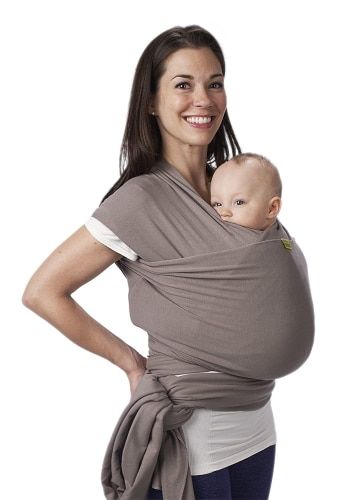
Our Rating: 4.5/5
Weight: 1.67 lbs
Weight Capacity: 35 lbs
Storage Capacity: None
Sunshade: Can be tied to shield from the sun
Freestanding: No
The Boba Baby Wrap Carrier is my choice for the best lightweight baby hiking carrier at just under two pounds. This stretchy and soft carrier is the carrier I use to carry my cat around the house (he loves it!).
Based on the pictures, you might worry that the wrap is flimsy and your baby will wiggle out, but rest assured, it is very snug and secure. I have to help my cat out when he’s ready–he can’t get out on his own.
While the wrap is highly customizable and machine washable, it is only suitable for infants up to three months.
The Boba Baby Wrap doesn’t have a dedicated sun shade, but you can easily wrap it to cover your baby’s face and, for that matter, to nurse in privacy.
PROS
- Stretchy and soft
- Machine washable
- Can nurse while wearing it
- Easy to customize the fit
CONS
- Suitable for newborns up to three months only
- Lacks storage features
CHECK PRICE ON:
#5 Luvdbaby Premium Baby Backpack Carrier
Best Baby Carrier for Hiking in Hot Weather
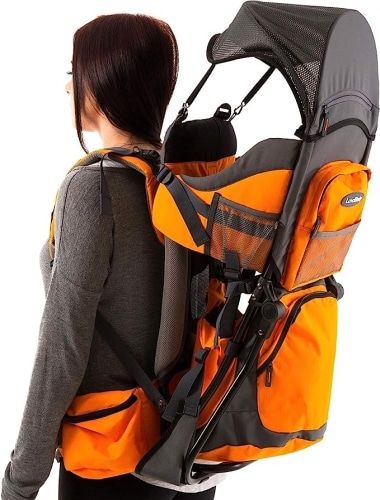
Our Rating: 4.7/5
Weight: 6.4 lbs
Weight Capacity: 40 lbs
Storage Capacity: 5 L
Sunshade: Yes
Freestanding: Yes
I chose the Luvdbaby Premium Baby Backpack Carrier as one of the best baby carriers for hiking in hot weather because of the foil-lined pocket for insulating cold items like bottles.
The Luvdbaby has lots of fun features, such as a sun shade, a rain cover, and a changing mat for kid comfort while diaper changing.
There is a five-liter zippered compartment below the cockpit, so while this is a relatively small storage space, there are many other small mesh pockets on the sides and the hip belt.
On the downside, I’ll note that while most reviews were positive, some shorter parents found the shoulder straps uncomfortable.
Finally, some users found it hard to unbuckle their kiddo when they were strapped in.
PROS
- Includes sun cover, rain cover, and changing mat
- Foil-lined pockets insulate cold items (i.e., bottles)
- Lots of storage pockets
CONS
- Hard to remove the kid from the pack
- Shorter parents may find it uncomfortable
#6 Deuter Kid Comfort Pro Child Carrier
Most Comfortable Baby Hiking Carrier
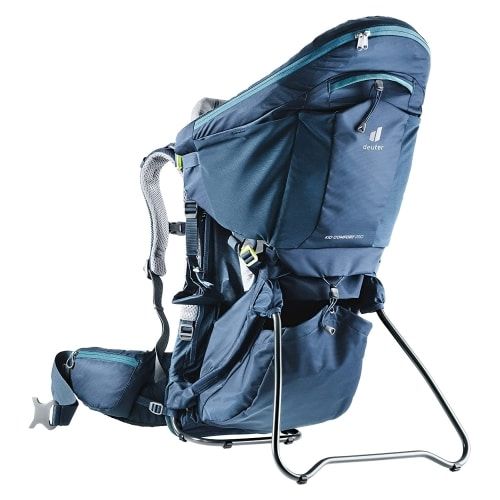
Our Rating: 5/5
Weight: 5 lbs
Weight Capacity: 7.7-40 lbs
Storage Capacity: 22 L
Sunshade: Yes
Freestanding: Yes
The Deuter Kid Comfort Pro Child Carrier is one of the best baby carriers for a comfortable hiking experience.
First, the Deuter Kid Comfort uses Aircomfort mesh on the back of the pack, and the aluminum frame keeps the pack off the parent’s back to allow for maximum airflow. The Kid Comfort Pro is ideal for back lengths of 17.3-22.8 inches.
You can pass this Kid Comfort Pro to your partner easily with the adjustable Vari Slide torso length, and everyone agrees the weight distribution system is perfectly honed.
The sun hood is permanently attached to the Deuter Kid Comfort Pro. All you have to do is slide it forward, and there’s a little mirror in the hip belt so you can check on your child without taking the pack off.
The Kid Comfort Pro is a comfortable carrier for kids too. Deuter included a small pillow with the pack so you can nap anywhere.
PROS
- Sunshade is easy to deploy
- Vari Slide adjustable torso length
- Detachable daypack
- Mirror included
- Pillow included
CONS
- Expensive
- It does not include a drool pad
#7 Thule Sapling Child Carrier
Most Versatile Child Hiking Carrier
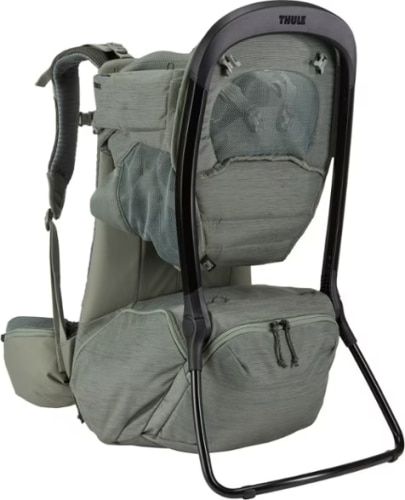
Our Rating: 4.7/5
Weight: 7 lbs
Weight Capacity: 48 lbs
Storage Capacity: 22 L
Sunshade: Yes
Freestanding: Yes
Baby seats inevitably end up messy and stained, but you can’t machine wash many baby carriers.
That’s what I like most about the Thule Sapling Child Carrier. You can take off the cockpit and drool pad to machine wash them. Brilliant.
Thule uses an ultra-comfortable ErgoRide child seat with a ventilated back panel to keep your kid cool, plus there are leg supports to prevent chubby leg chafing.
The Thule Sapling Child Carrier has 22 liters of storage, and I appreciate that you can access them from either side or the back of the pack. This freestanding kid carrier comes with a sunshade.
If there are any downsides, it’s the expense and the fact that it only comes in grey and black.
PROS
- Machine washable child seat and drool pad
- ErgoRide child seat has ventilated back panel and leg support
- Additional sling pack and rain cover (not included)
- Dual access to gear compartment through size zippers
CONS
- Expensive
- Colors are drab
#8 phil&teds Escape Child Carrier Frame Backpack
Best Compact Baby Carrier for Hiking
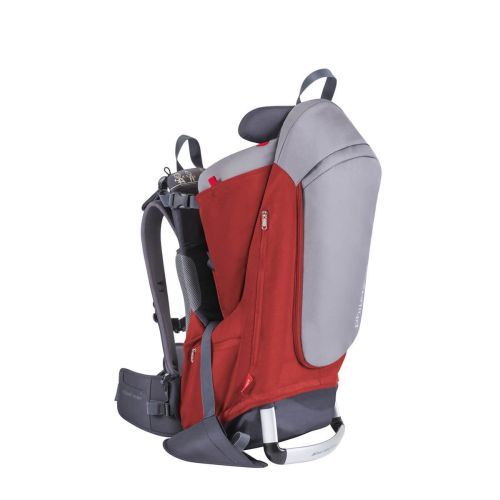
Our Rating: 4.6/5
Weight: 9 lbs
Weight Capacity: 40 lbs
Storage Capacity: Not listed
Sunshade: Yes
Freestanding: Yes
Have you noticed that many baby carriers for hiking are enormous? Yes, they may have storage for days but don’t pack down small, making storage challenging.
If you’re a space-challenged hiking parent, check out phil&teds Escape Child Carrier Frame Backpack.
This toddler hiking carrier backpack has a metal frame but a slim profile that packs down small and flat without sacrificing safety features like a five-point child harness and molded headrest to keep your kid locked and loaded.
I love that the Escape Child Carrier has a detachable daypack, but I’m bummed that the daypack size isn’t listed.
Weirdly, even though this baby carrier packs flat, it’s heavier than some of the bulkier carriers on my list at nine pounds.
PROS
- Folds flat for easy storage
- Detachable daypack
- Compatible with a water bladder (sold separately)
CONS
- Heavy
- Storage capacity not listed
#9 Minimeis G4 Shoulder Carrier
Best Hiking Carrier for a 1-Year-Old
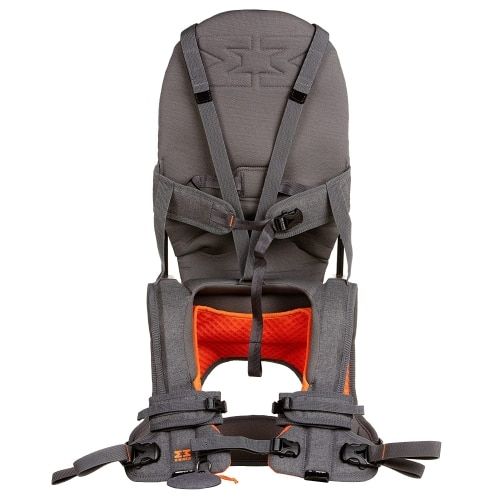
Our Rating: 4.7/5
Weight: 3.5 lbs
Weight Capacity: 40 lbs
Storage Capacity: None
Sunshade: No
Freestanding: No
At one year of age, most American babies weigh approximately 20 pounds, so I chose the Minimeis G4 Shoulder Carrier as the best baby carrier for a one-year-old.
Two Scandinavian dads invented the Minimeis. Unlike traditional baby carriers for hiking, the Minimeis puts the child seat right on the parent’s shoulders.
This design takes the weight off your shoulders and neck and gives the baby a great view of the surroundings.
Although the Minimeis is rated up to 40 pounds, I strongly suspect that 20 pounds is perfect for this carrier, which sits directly on your shoulders.
The Minimeis packs are small, lightweight, and you get a full refund if you’re unhappy. On the downside, this is a minimalist pack. It doesn’t have a sunshade or storage space.
Additionally, just like when you sit a baby on your shoulders, it will have free reign of your head and hair (downside!).
PROS
- Lightweight
- Minimizes weight on the neck and shoulders
- It gives children a good view of the surroundings
- Packs small
- Full refund if you’re not happy
CONS
- No storage space
- Baby has free reign of your head
#10 Colugo The Baby Carrier
Best Carrier for a 2-Year-Old and 3-Year-Old
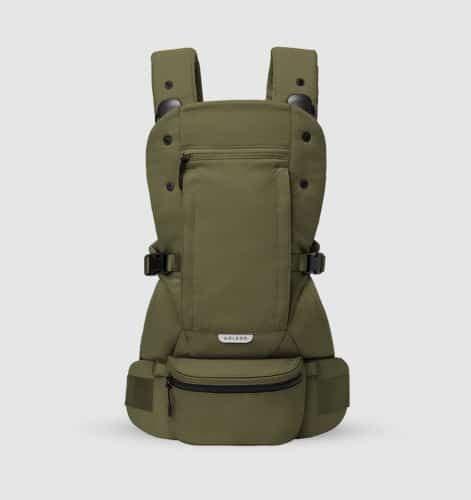
Our Rating:
Weight: 1.5 lbs
Weight Capacity: 7-33 lbs
Storage Capacity:
Sunshade: Yes
Freestanding:
Since the average American two and three-year-old is between 25-30 pounds, I chose the Colugo The Baby Carrier as the best choice for this age range.
The Baby Carrier is a front-facing soft shell child carrier backpack for a 2-year-old with a weight capacity of 33 pounds. The Baby Carrier always sits in front of you, but the baby can face you or away from you.
The Baby Carrier has a removable fanny pack and is entirely machine washable. Like the other soft-sided baby carriers, it also turns into a nice, compact shape.
Finally, this child carrier has a UPF 50+ sunshade featuring breathable mesh fabric to keep your kiddo cool.
PROS
- Removable fanny pack
- Machine washable
- Breathable mesh fabric
- Rolls up compactly
CONS
- It needs more storage space
#11 Chicco SmartSupport Aluminum Frame Backpack Carrier
Best Carrier for a 4-Year-Old or 5-Year-Old
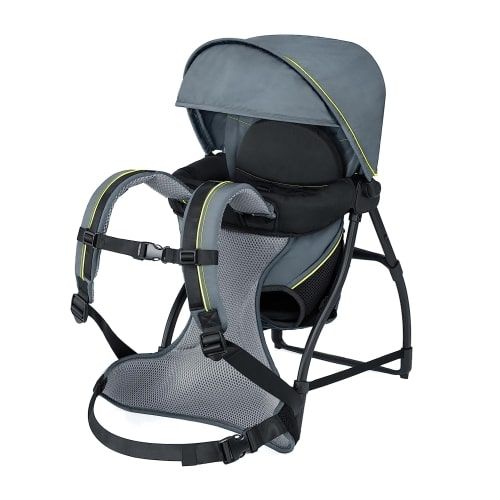
Our Rating: 4.6/5
Weight: 6.2 lbs
Weight Capacity: 17-40 lbs
Storage Capacity: None
Sunshade: Yes
Freestanding: Yes
By the time your child reaches four or five, they should be transitioning out of needing a carrier for extended periods, but you’ll still want something comfortable for both you and your child when they need to hop in.
The Chicco SmartSupport Aluminum Frame Backpack Carrier is rated for children 17-40 pounds, making it an ideal pack for a 4-year-old or 5-year-old.
The Chicco SmartSupport has an adjustable child cockpit and a UPF 50+ sunshade to keep your child cool. For additional child comfort, the back of the cockpit has padding too.
A five-point harness in the cockpit and mesh on the back panels keep you cool too.
One issue I don’t like about the Chicco SmartSupport is that there isn’t gear storage beyond a few small pockets for snacks.
PROS
- Adjustable child seat
- Five-point safety harness
- Mesh on the back panels for breathability
CONS
- Shoulder pads need to be thicker
- No additional space for storage aside from small side pockets
#12 BabyBjörn New Baby Carrier One Air
Best Carrier for Ergonomic Baby Position
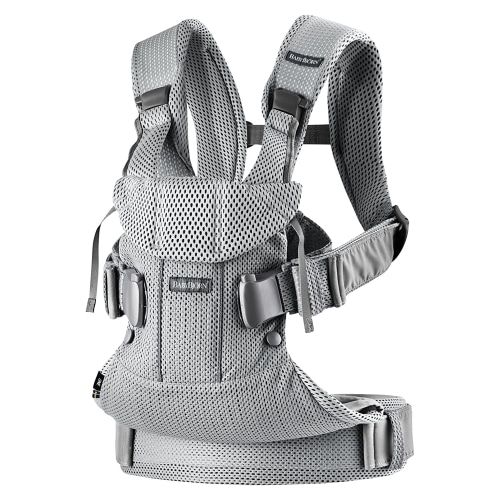
Our Rating: 4.9/5
Weight: 2.81 lbs
Weight Capacity: 8-33 lbs
Storage Capacity: None
Sunshade: No
Freestanding: No
Some mamas worry that child carriers may not support their children’s hips and back correctly, and for some babies with predispositions, that may be a valid concern.
If you have a reason to be worried about this, consider the BabyBjorn New Baby Carrier One Air.
The International Hip Dysplasia Institute certified this product as safe for your baby’s posture. There are specific weight requirements for how the baby can sit.
For example, the forward-facing maximum child weight is 26 pounds. You can find the complete guidelines on the website linked.
Although the New Baby Carrier One Air has excellent ergonomics, it will come at the price of having no gear storage, sunshade, or freestanding ability. Further, this pack is only suited for newborns through 36 months.
PROS
- International Hip Dysplasia Institute certified
- Adjustable head support
- Adjustable seat width
- Breathable mesh is machine washable
CONS
- Best for 0-36 months
- No gear storage or sunshade, and it is not freestanding
CHECK PRICE ON:
#13 Deuter Kid Comfort Active SL Child Carrier–Women’s
Best Carrier Specifically for Women
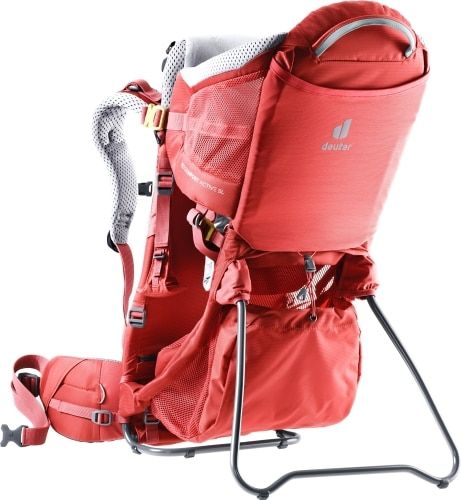
Our Rating: 5/5
Weight: 5.9 lbs
Weight Capacity: 48 lbs
Storage Capacity: 14 L
Sunshade: Yes, sold separately
Freestanding: Yes
A women-specific pack may be in order if you’re a single mom or your partnership involves two women.
The Deuter Kid Comfort Active SL Child Carrier is one of the few women-specific carriers on the market, and it prioritizes comfort for both the wearer and the child.
The Deuter Kid Comfort Active has mesh padding on the back for breathability while keeping the bulk of the weight close to your back for maximum ergonomic comfort.
This Deuter Kid Comfort carrier uses a shorter back length (don’t worry, it’s still adjustable) and a narrower frame than the standard Deuter baby hiking backpack and other packs like it.
You may find the classic Deuter Kid Comfort more suitable if you don’t have a traditionally feminine profile.
I love that the Kid Comfort has color-coded buckles on the harness system, but I hate that you must purchase the sunshade separately.
PROS
- Shorter torso length and a narrower profile for classically feminine profiles
- Color-coded buckles
- Lightweight
CONS
- Sunshade sold separately
- Expensive
#14 Osprey Poco LT Child Carrier
Best Carrier for Traveling
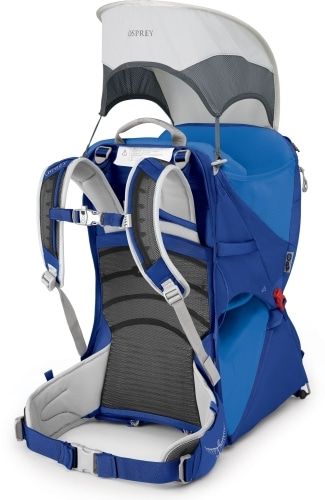
Our Rating: 5/5
Weight: 5 lbs 1 oz
Weight Capacity: 48 lbs
Storage Capacity: 21 L
Sunshade: Yes
Freestanding: Yes
Don’t let having a baby deter you from traveling. The Osprey Poco LT Child Carrier will make your life easier on the road! This Osprey baby carrier is one of the best baby carriers for traveling for several reasons.
One, it is lighter and smaller than the Osprey Poco or Osprey Poco Plus (and lighter than most other carriers on my list too).
The Osprey Poco LT Child Carrier has a slimmer profile (by half) than most other framed hiking packs, making it ideal for navigating crowds.
I also love that you can zip the shoulder and hip straps away and send them through the airport as a standalone piece of luggage.
Since the Poco (which means “small”) is smaller, this is also an ideal pack for petite women.
PROS
- Smaller and lighter than the Osprey Poco or Poco Plus
- It takes up half the space of most framed hiking packs
- Top and side grab handles
- Shoulder straps and hip belt can be zipped away (perfect for sending through as airline luggage)
CONS
- No foot stirrups
- Sunshade may hit the parent’s head
CHECK PRICE ON:
#15 Osprey Poco Plus
Best Carrier for Overnight Travel
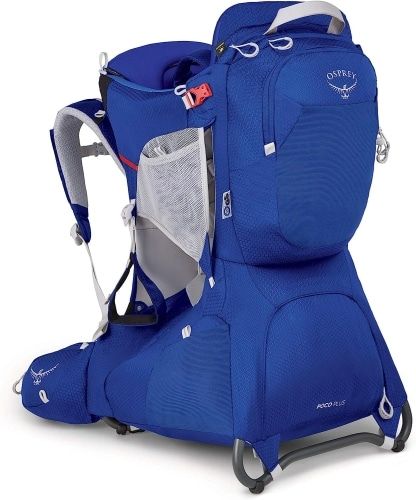
Our Rating: 4.9/5
Weight: 7lbs 14.4 oz
Weight Capacity: 48 lbs
Storage Capacity: 26 L
Sunshade: Yes
Freestanding: Yes
Backpacking with a small child is about as easy as making a trip to the moon with a small child. If you want to make that journey, choose the Osprey Poco Plus.
The Osprey Poco Plus is one of the best baby hiking carriers for backpacking because of its large storage capacity.
You will need a partner or two (or three) to help carry all your adult gear into the backcountry.
The Osprey Poco Plus is highly customizable, so it’s comfortable for both the adult and the child. I like that the Poco Plus has an adjustable torso length and hip belt size and is compatible with a hydration reservoir.
The Osprey Poco Plus has toy loop attachments to keep your small one occupied on a long hike, plus it has foot loops for kid comfort.
PROS
- Toy loop attachment points
- Hydration reservoir compatible
- Adjustable torso length and hip belt size
- Lots of internal space
CONS
- Expensive
CHECK PRICE ON:
Buying Guide: How to Choose the Best Hiking Carries for Babies and Toddlers
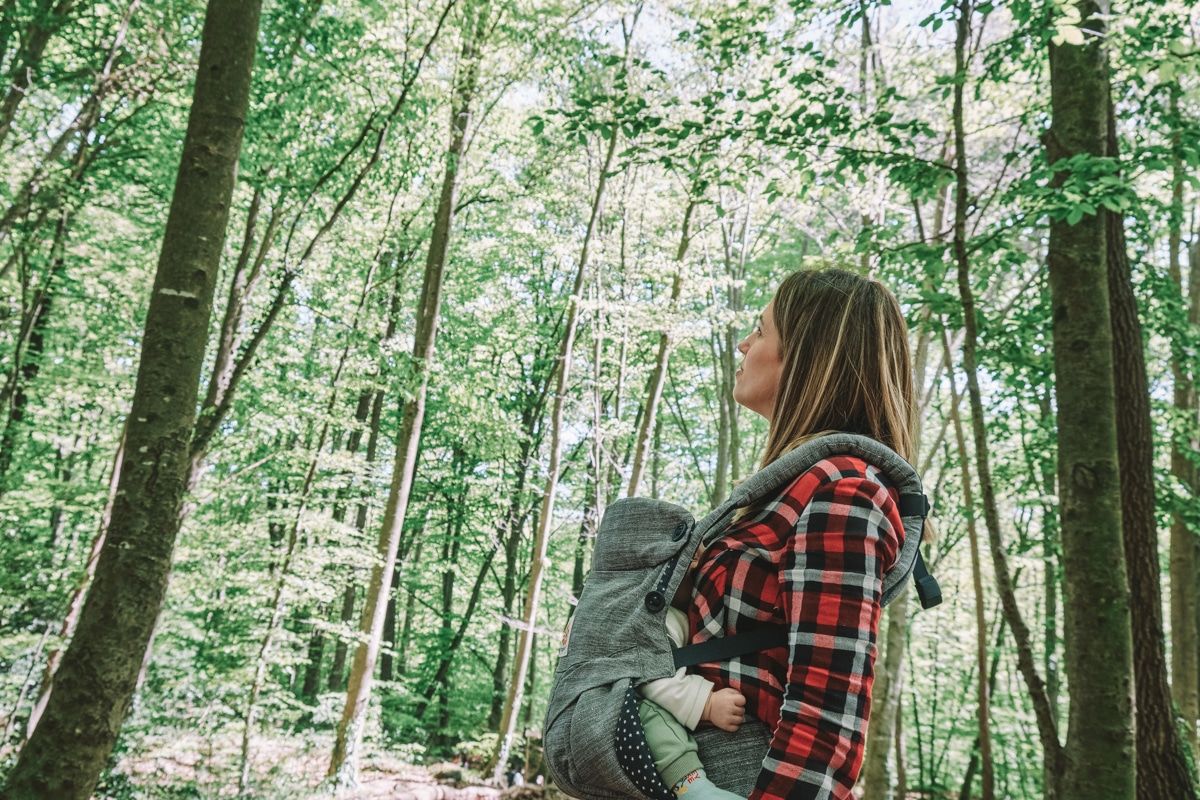
What to Look for in Baby and Toddler Hiking Carries
There are some features to look out for when you’re preparing to spend a few bucks on a carrier.
And if you’re short on time, REI has a great video about how to choose a child carrier backpack:
Padded Hip Belt
A padded, zippered waist belt is *essential* on a baby carrier, especially if you intend to do longer hikes.
The padding on the waist belt should fit snugly right on the top of your hip bones and distribute the kid’s weight off your shoulders and back.
As a slender person, I find it challenging to get packs with a belt that tightens down enough for me, so keep that in mind if you plan to share the pack with a partner (i.e., one size does not fit all when it comes to hiking backpacks).
Bonus points if the hip belt has little zippered storage pockets.
Padded Shoulder Straps
Men’s and women’s packs differ slightly in the shape and width of the shoulder straps.
Men’s straps tend to be wider, while women’s have narrower shoulder straps that slightly cut toward the middle of the body.
Most baby carriers meet in the middle so that either parent can use the pack comfortably, so just be sure to look for padded shoulder straps.
Adjustable Torso
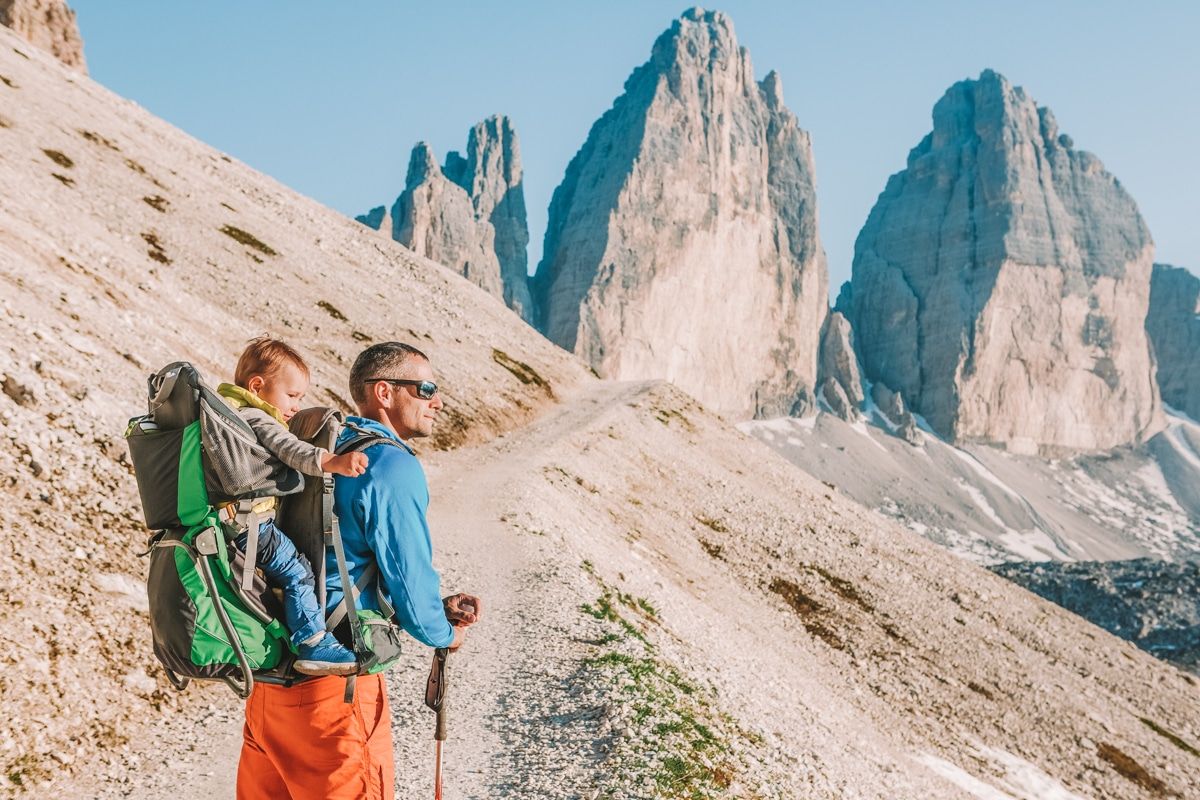
The best baby carriers for hiking will have an adjustable torso length on the back of the pack to accommodate short and tall parents.
Safety Harness and Roll Cage
Hiking baby carriers must be safe for the wee one, so look for backpack carriers with a child harness and an aluminum roll cage.
I know, those things sound intense.
The safety harness system should keep the kid inside the carrier (say, if you tripped or the baby got too squirmy and tried to get itself out).
The padded aluminum roll cage will insulate the child from impact should you take a tumble, which is more likely to happen with a heavy backpack.
Weight Capacity
Most baby carriers have weight capacities between 30-45 pounds, which should be enough for a tot plus accouterments.
Remember, however, that just because your pack is rated for that much weight doesn’t mean your back is rated similarly.
The rule of thumb in backpacking is; your pack shouldn’t weigh more than 20% of your body weight. As a 120-lb woman, that’s 24 pounds for me. For a 200-lb person, that would be 40 pounds.
Storage Capacity
In addition to holding your pride and joy, it should contain all the accessories your pride and joy (and you) need to be comfortable on the trail.
A quality kid carrier will have extra space for storage. Some have a large zippered compartment; others have smaller gear storage slots on the sides.
We measure a pack’s interior space in liters. A good-sized day pack would have 30 liters of space. For short day hikes, I use a fraction of that space.
Sunshade
The best hiking baby carriers have a built-in sunshade and rain cover. The designs vary, but remember that a very tall shade will be prone to catching on tree limbs.
Freestanding
A good baby backpack carrier will stand up independently if you set it on the ground. Some baby carriers have a metal kickstand to achieve this. Nothing worse than a faceplanted baby in a carrier!
Foot Stirrups
A comfortable carrier for a kid will have adjustable foot stirrups. Foot stirrups allow the toddler to stand up a little, get some wiggles out, take the weight off their bums, and also give the legs a place to go that’s not the parent’s face.
Toy Attachment Points
Every kid has that essential toy or pacifier. Look for a kid carrier with toy attachment points to prevent that item from falling in the dirt a thousand times.
Thankfully, many child carriers have attachment points for a toy or a pacifier within a kid’s grasp.
Honorable Mention Features
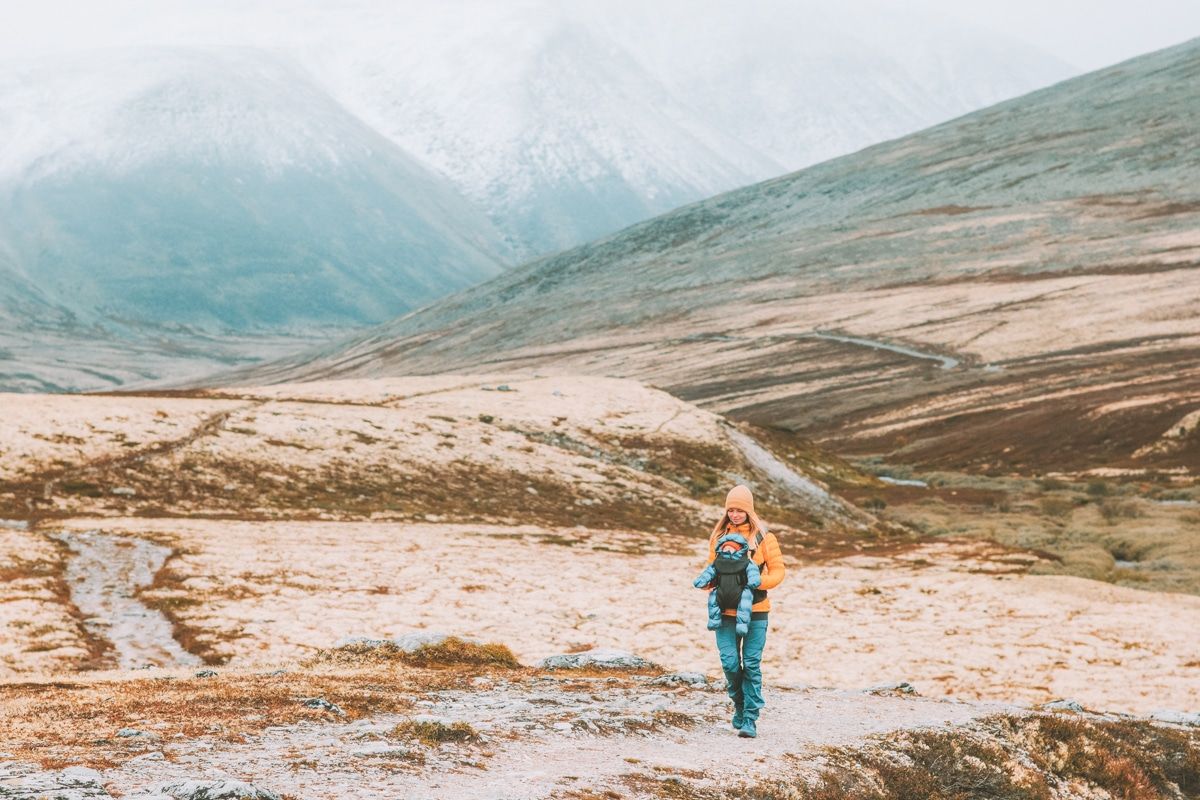
These features aren’t essential for safety, but they can be super handy.
- Hydration Bladder: Water is heavy and bulky, so bladders are popular. You can fill a pouch with several liters of water that’ll live in a hydration sleeve closest to your back (aka, the most ergonomic spot for it), and you’ll have a tube to sip from without having to awkwardly reach around for a water bottle.
- Removable Drool Pad: Hiking parents with a very young child may find a washable drool pad desirable. This little pad is positioned before the small guy’s face to catch the spit from flowing into your hair (yay!).
- Removable Daypack: This is a nice feature for backpacking trips or longer hikes if you plan to stop and picnic for a while in one spot. A removable daypack is usually a little fanny pack that you can use separately from the main pack.
Tips for Hiking with a Child
- Don’t try to conquer Kilimanjaro on your first outing with your smallie. Start somewhere with good cell service that is short and flat.
- Go with a partner, friend, or family member the first few times. They can check on the child, make sure the baby is riding correctly in the carrier, help you carry, and keep you company.
- Don’t be discouraged if your child gets fussy in the carrier. New things are hard. As long as the carrier is adjusted for adequate child comfort, keep going.
- Bring clothing layers for you and the wee one.
- Prepare for messes. From poopy butts to dirty hands to spit up, come ready with wet wipes and a baggie to hold the dirties.
FAQs About Kid Carriers for Hiking
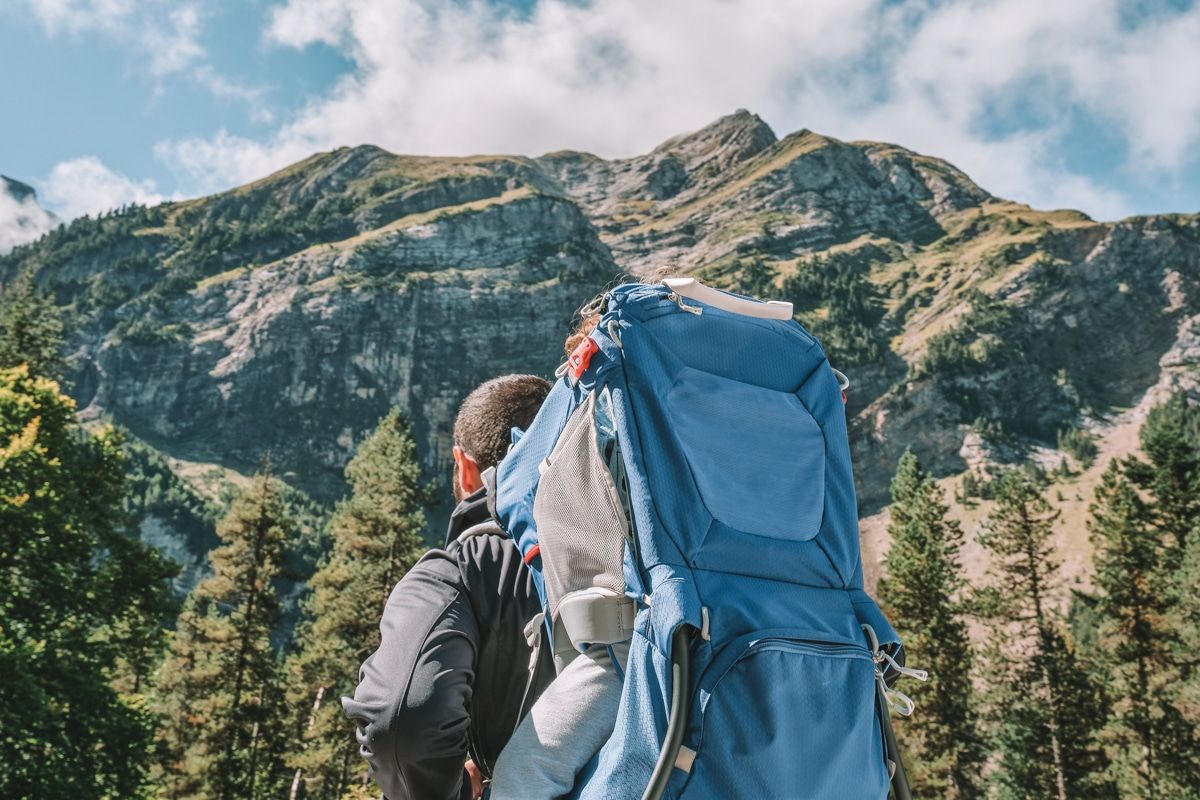
Are baby hiking carriers worth it? How about toddler hiking carriers?
There isn’t a big difference between a hiking baby carrier and a hiking toddler carrier (apart from weight capacity), and they are worth it if you want to keep hiking after you have a baby.
The best hiking baby carriers distribute the child’s weight onto your hips, free up your hands, provide shade and light rain protection, and provide space for hiking gear and child necessities.
How old should a baby be to use a hiking carrier?
Your baby should be able to sit up and control their neck before you take them hiking in a carrier with a frame. Most babies can do this around six months old. If you have any doubts or concerns, talk to your pediatrician.
You can safely carry younger babies in a soft-sided swaddle carrier, but you should carry them in front of you and facing you.
Can I use a regular baby carrier for hiking?
Humans have been swaddling and strapping their babies to wooden planks to carry them around for millennia. So, yes, you can use soft shell carriers for hiking, but you may find this uncomfortable for longer hikes when the child gets bigger.
Hiking-specific child carriers come with comfort features like a harness system, padded waist belt, built-in sunshade, plus storage for snacks and water, which make them a preferable option for regular hikers.
How do you carry a baby while hiking? How about a toddler? Is a front or back carrier better?
How you carry your baby while hiking is a matter of personal preference and comfort, but the general rule is that you should carry babies under six months in a sling or soft carrier in front of you.
That’s because babies this small need neck support, and they often benefit from the physical closeness of their caregiver.
A backpack-style carrier may be more comfortable once a baby can sit up and control its neck.
Is it safe to hike with a newborn?
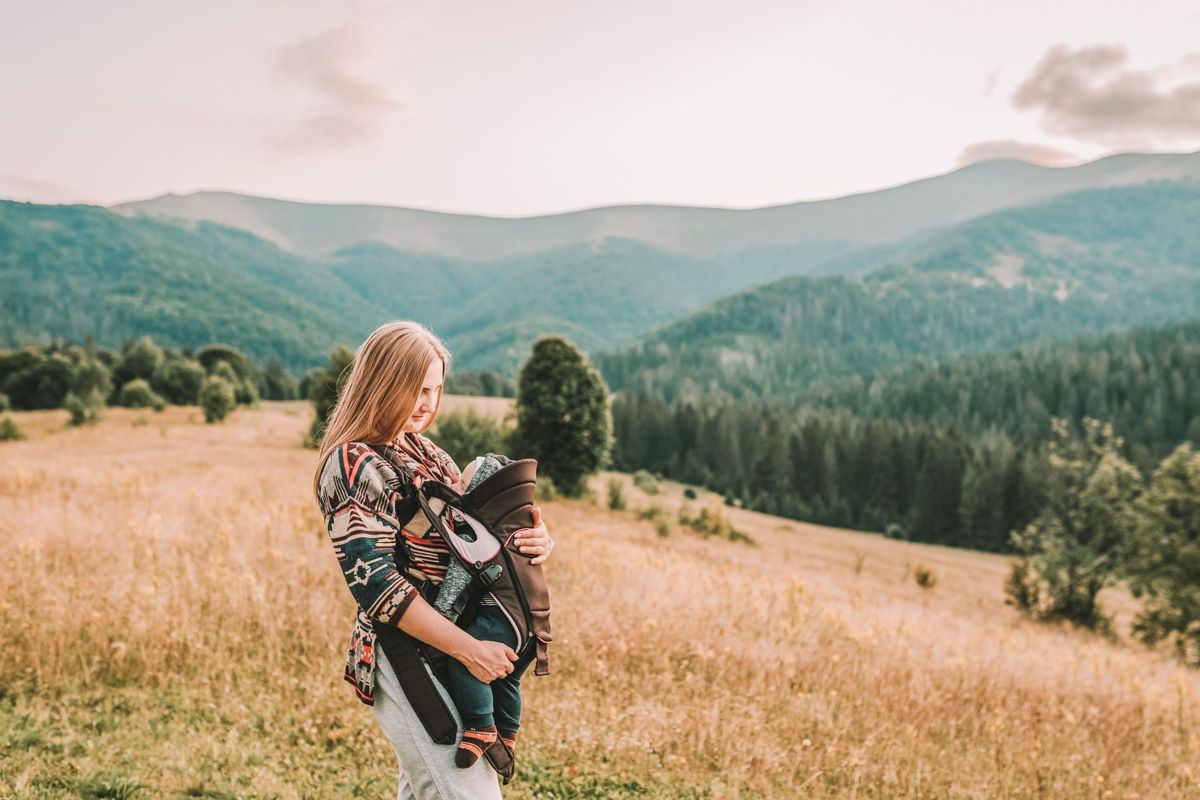
Since the dawn of humanity, women have had children and had stuff to do in the days and years following. They didn’t have the luxury of sitting in a cozy, temperature-controlled home, so bringing a baby with them everywhere was the norm.
All that to say, yes, it is safe to hike with a newborn, provided you support their head and neck as you would any other time you hold them.
Is it *fun* to hike with a newborn? That totally depends on you and your newborn.
How much should a baby weigh for a hiking carrier?
Every baby carrier has a slightly different weight minimum, so read the instructions before you purchase.
Your baby should be able to control their head and neck before you put them in a backpack carrier. For most babies, this is around six months and 16 lbs.
What’s the maximum weight for a toddler carrier?
Most baby carriers max out at about 45 pounds, the average weight for an American five-year-old.
Not only is it unsafe and uncomfortable for most parents to carry this much on their backs, but by this age, most children should be able to hike on their own– for short distances, anyway.
Why shouldn’t I use a baby carrier?
Overwhelmingly, child carriers are safe to use. However, you must ensure that the carrier fits your child well.
Using the wrong type or size child carrier on a newborn could cause neck strain or damage, asphyxia, or limb compression. This is why the recommendation is that you only place children old enough to control their heads and neck in backpack-style carriers.
As with any situation involving a baby, you should check the child frequently for safety and comfort.
Is it better to walk a baby in a stroller or in a carrier?
Whether you use a stroller or a backpack-style child carrier should depend on the activity you are pursuing. A stroller is fine if you walk around your neighborhood, mainly on the sidewalk.
You should use a backpack carrier to explore an unpaved trail.
What can I use instead of a baby or toddler carrier?
If you’re hiking but don’t have a framed kid carrier, you can use your arms! Don’t forget that your arms are a viable (if not sustainable) carrying mechanism.
You can also use a front-loading sling or soft structured carrier. If the trail is even and paved, you could opt for a wagon or bike trailer.
At what age do you stop using a baby carrier?
You should stop using a baby carrier when your child becomes too heavy for the max weight rating on the carrier or too heavy for you to carry safely, whichever comes first.
Conclusion: Our Pick for the Best Baby and Toddler Hiking Carrier
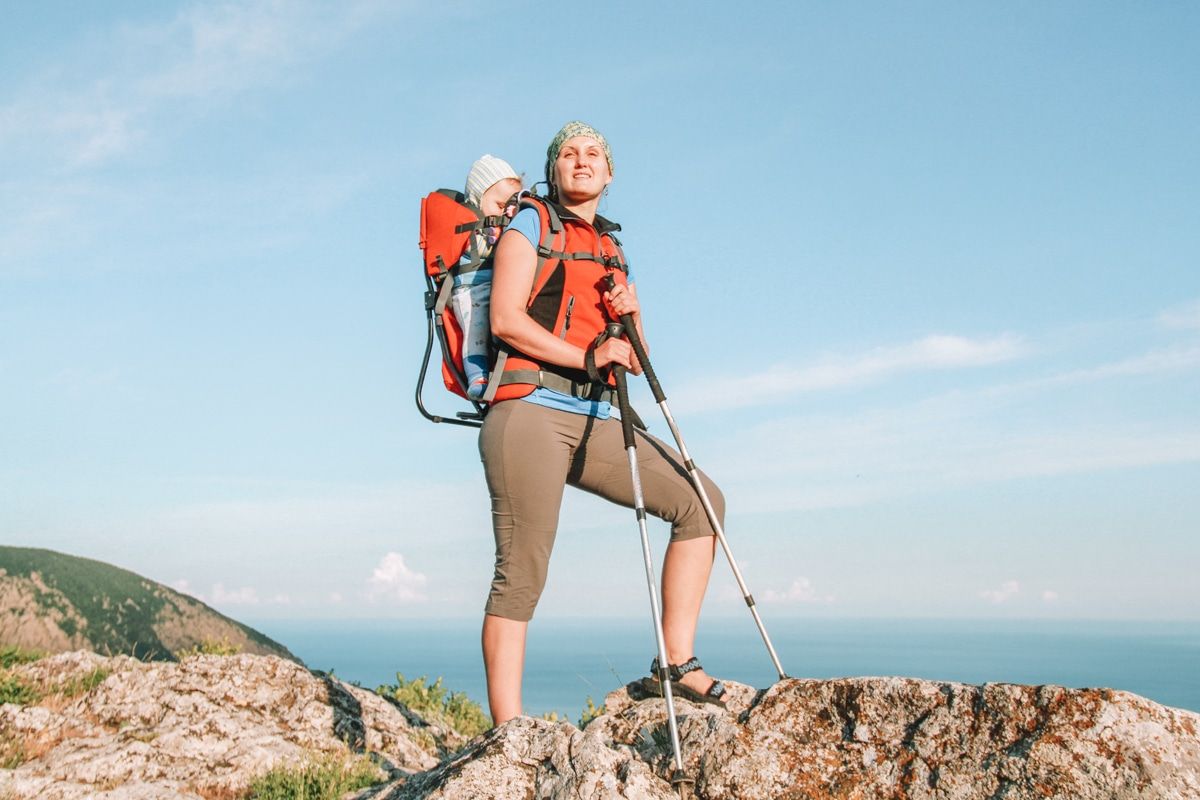
My top two baby carriers are the Osprey Poco LT Child Carrier and the Kelty Journey PerfectFIT Elite Child Carrier.
The Osprey Poco LT Child Carrier has a weight capacity of 48 pounds and a whopping 21 liters of gear storage.
You can neatly zip up this slim profile carrier, and it’s ideal for navigating tight spots or crowds.
The Poco LT is extremely lightweight at just five pounds and ideal for shorter parents.
The Kelty Journey PerfectFit Elite Child Carrier is the best baby carrier for parents who need every luxe feature. This backpack carrier has a weight capacity of 50 lbs and a storage capacity of 26 liters.
This pack has water bottle holders, is hydration bladder compatible, has nine external pockets, and has a large main pocket.
The suspension system and metal roll cage give your child ultimate safety, while the wide seat and adjustable foot stirrups provide comfort.
ABOUT THE AUTHOR

Meredith Dennis
Meredith is a biologist and writer based in California’s Sierra Nevada. She has lived in 6 states as a biologist, so her intel on hiking and camping is chef’s kiss next level. One of her earliest camping memories was being too scared to find a bathroom at night on a family camping trip. Thankfully, she’s come a long way since then and she can help you get there too!
Shopping for hiking and backpacking gear? Check out these related articles below!
Best Minimalist Hiking Sandals
Best Handheld GPS Devices for Hiking
Best Outdoor Watches for Active People
Best Waterproof Walking Shoes for Women
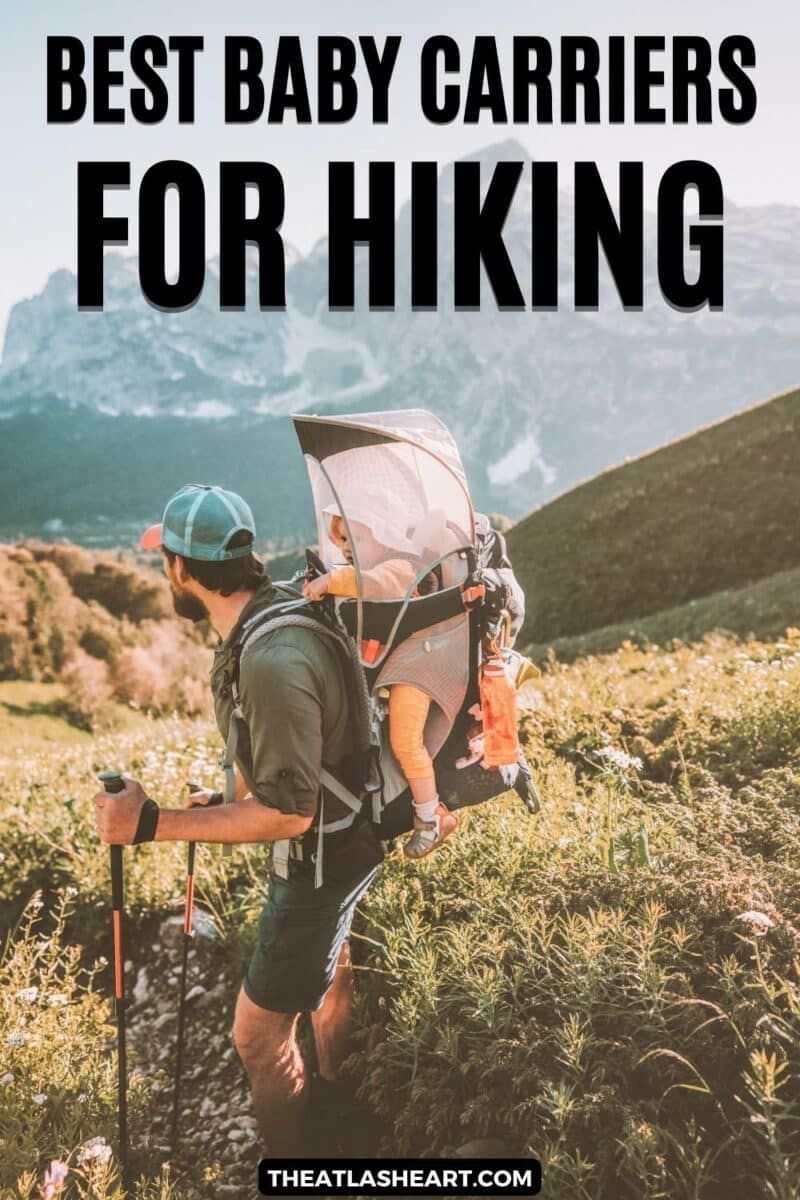
Pin this image for future reference

